Browse in the Library:
| Artist or Composer / Score name | Cover | List of Contents |
|---|---|---|
| Autum Song (October) – Tchaikovsky The Seasons (Musescore File).mscz | ||
| Autumn In New York (Guitar Arr. With Tab) | Autumn In New York (Guitar Arr. With Tab) | |
| Autumn In New York (Guitar Arr.) (Musescore File).mscz | ||
| Autumn Leaves Joseph Kosma Jazz Standard Piano Solo arr |
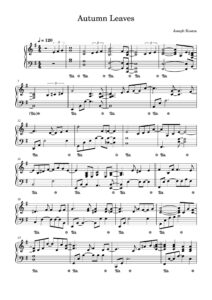 |
|
| Autumn Leaves Joseph Kosma Jazz Standard Piano Solo arr.mscz | ||
| Autumn Leaves Piano Bar Arr. Johnny Mercer Joseph Kosma Jacques André Marie Prévert | Autumn Leaves Piano Bar Arr. Johnny Mercer Joseph Kosma Jacques André Marie Prévert | |
| Autumn Leaves – Jazz Play Along LEAD SHEET MUSIC |
 |
Audio MP3 included in Aebersold’s Vol. 44 (Autumn Leaves) |
| Autumn Leaves – Piano Bar Arr. Johnny Mercer Joseph Kosma Jacques André Marie Prévert (Musescore File).mscz | ||
| Autumn leaves (Eva Cassidy) | ||
| Autumn Leaves As Played By Bill Evans (Musescore File).mscz | ||
| Autumn Leaves Cannonball Adderley And Miles Davis Sax Alto |
 |
|
| Autumn Leaves Music by Joseph Kosma |
 |
|
| Autumn Leaves Piano Solo – as played by Hank Jones.mscz | ||
| Autunm Leaves (Musescore File).mscz | ||
| Avatar – Leona Lewis – I See You |
|
Avatar I see you |
| Avatar sheet music Book James Horner |
|
Avatar |
| Ave Maria (Joyeux Noël OST) Philippe Rombi | ||
| Avenged Sevenfold Nightmare Guitar TAB |
 |
Avenged Sevenfold Nightmare Guitar TAB |
| Avenue Q The Musical Songbook |
 |
Avenue Q The Musical Songbook |
| Avicii – Wake Me Up Sheet Music Piano Vocal Guitar chords |
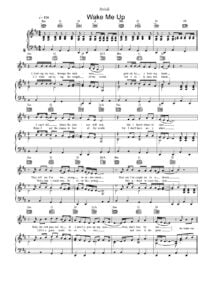 |
|
| Avishai Cohen Songbook Vol I |
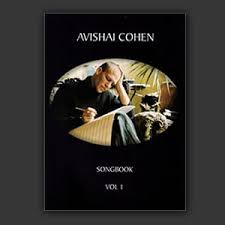 |
Avishai Cohen Songbook Vol I  |
| Avril Lavigne – Complicated | ||
| Avril Lavigne – Freak Out | ||
| Avril Lavigne – Im With You | ||
| Avril Lavigne – Innocence | ||
| Avril Lavigne – My Happy Ending | ||
| Avril Lavigne – When Youre Gone | ||
| Avril Lavigne – Why | ||
| Avril Lavigne the Best Damn Thing Songbook |
 |
Avril Lavigne the Best Damn Thing Songbook |
| Avril Lavigne Under My Skin |
 |
Avril Lavigne Under My Skin |
| Awaken (Jane Eyre OST 2011) Dario Marianelli | ||
| Awakenings Dexter’s Tune by Randy Newman |
 |
|
| Away In A Manger – Guitar TABlature |
 |
|
| Axel F from Beverly Hills Cop b Harold Faltermeyer Piano Vocal Guitar Chords sheet music |
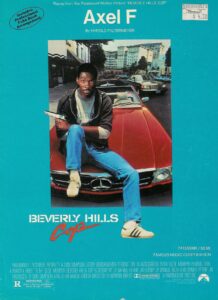 |
|
| Axel Jorgensen ROMANCE for Trombone and Piano Op. 21 |
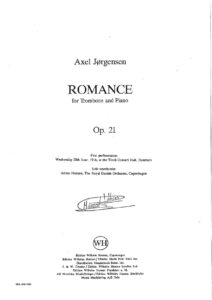 |
|
| Aya Hirano – God Knows Suzumiya Haruhi no Yuutsu OST Piano Solo |
 |
|
| Ayumi Hamasaki – Voyage | Ayumi Hamasaki – Voyage | |
| Ayumi Hamasaki All In | Ayumi Hamasaki All In | |
| Aziza Mustafa Zadeh Always Sheet Music |
 |
|
| Aziza Mustafa Zadeh Holiday Blessings |
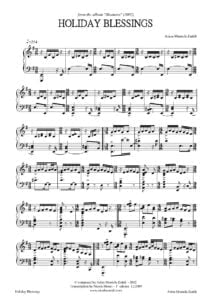 |
|
| Aziza Mustafa Zadeh Strange Mood |
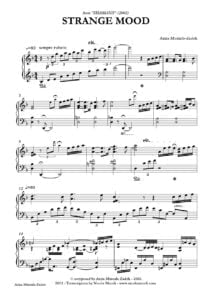 |
|
| Aziza Mustafa Zadeh – Dreaming Sheherezadeh |
 |
|
| Aziza Mustafa Zadeh – Melancholic Princess |
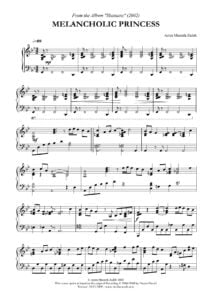 |
|
| Aziza Mustafa Zadeh – Barabashka |
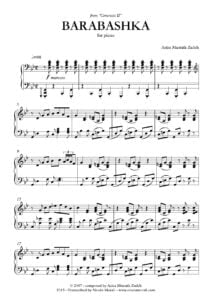 |
|
| Aziza Mustafa Zadeh Two Candles |
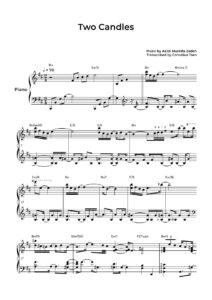 |
|
| B Witched – Cest La Vie | ||
| B Witched – Rollercoaster | ||
| B. B. King Live At The Regal Guitar TAB |
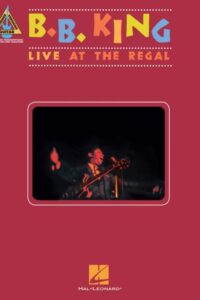 |
B. B. King Live At The Regal Guitar TAB |
| B.B. King Anthology Guitar TAB |
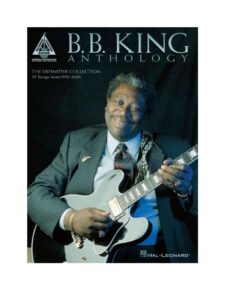 |
B.B. King Anthology Guitar TAB |
| B.B. King Greatest Hits |
 |
B.B. King Greatest Hits |
| B.B. King Guitar Play Along Vol. 100 – with MP3 audio embedded with Tablature |
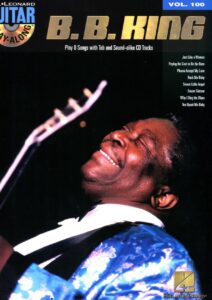 |
Guitar Play Along Vol. 100 – B.B. King |
| B.B. King The Definitive Collection Guitar Signature Licks with TABs By Wolf Marshall |
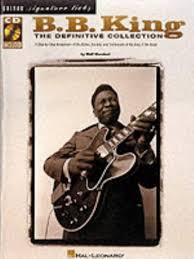 |
B.B. King The Definitive Collection Guitar Signature Licks By Wolf Marshall_compressed |
| Baby Elephant Walk (Hatari OST) Henry Mancini | ||
| Baby Elephant Walk Mancini (Musescore File).mscz | ||
| Babyface, The Songs Of (Kenneth Brian Edmonds) |
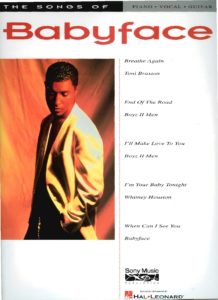 |
Babyface, The Songs Of (Kenneth Brian Edmonds) |
| Bach – Jesu Bleibet Meine Freude Guitar arr.mscz | ||
| Bach – Siciliano In G Minor (Musescore File).mscz | ||
| Bach – Siciliano in G minor Piano solo (Intermediate) |
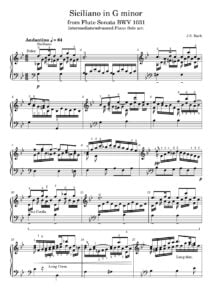 |
|
| Bach J.S. – Aria Mit Variationen Goldberg Variationen Bwv 988 Mit Noten – Sheet Music (Musescore File).mscz | ||
| Bach J.S. – Orchestral Suite No. 1 In C Major Bwv 1066 Passepied (Easy Piano Solo) (Musescore File).mscz | ||
| Bach J.S. For Bass Guitar Mel May Publications |
 |
|
| Bach – Analysis of J.S. Bach’s Wohltemperirtes clavier (48 preludes & fugues) ( Book ) Riemann |
 |
|
| Bach – Arioso (Musescore File).mscz | ||
| Bach – Cello Suite No. 1 In G Major Bwv 1007 Arr. Guitar (Musescore File).mscz | ||
| Bach – Chaconne Bwv 1004 Guitar Arr. (Musescore File).mscz | ||
| Bach – Easy Pieces for Classical Guitar – Notes & Tablature |
 |
Bach – Easy Pieces pieces for guitar |
| Bach – Kurtag – Transcriptions for piano four hands |
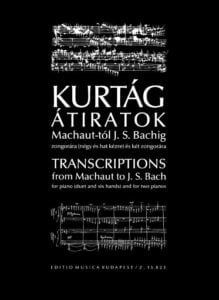 |
|
| Bach – Masterworks of Johann Sebastian Bach ( Book) |
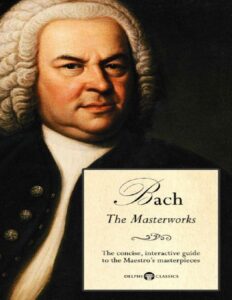 |
|
| Bach – Music in the Castle of Heaven by John Eliot Gardiner (Book) |
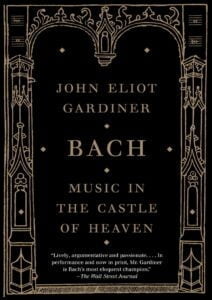 |
|
| Bach – Praeludium Et Fuga In D Bwv 539 Piano Solo (Musescore File).mscz | ||
| Bach – Prelude And Fugue In A Minor (Bwv 543) (Musescore File).mscz | ||
| Bach – Sheep May Safely Graze (Schafe Könen Sicher Beiden) Aria From The Cantata Bwv 208 Easy Piano |
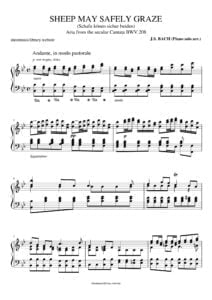 |
|
| Bach – Siciliano (Easy Piano arr. from Flute Sonata BWV 1031 with sheet music) |
 |
|
| Bach – Siciliano (Easy Piano Arr. From Flute Sonata Bwv 1031 With Sheet Music) (Musescore File).mscz | ||
| Bach A Life In Music by Peter Williams (2006) Biography Book |
 |
|
| Bach Baden Powell Jesus Bleibet Meine Freude Guitar Tablature Tabs |
 |
|
| Bach Bourée (Piano Solo) Jethro Tull (Musescore File).mscz | ||
| Bach Busoni Complete Transcriptions |
 |
Bach Busoni Complete Transcriptions |
| Bach Bwv 22 – Sanctify Us By Thy Goodness Piano Arr. Harriet Cohen (Musescore File).mscz | ||
| Bach Cello Suite No. 1 In G Major For Guitar (Musescore File).mscz | ||
| Bach Chaconne BWV 1004 Abel Carlevaro Guitar Masterclass IV |
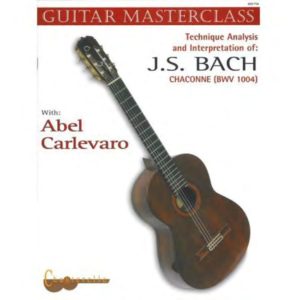 |
|
| Bach Chaconne D minor arr. for guitar |
 |
|
| Bach Forty Chorales Arr. For Piano Solo |
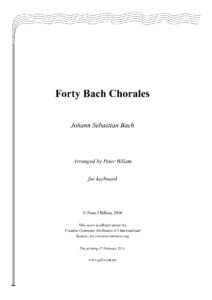 |
|
| Bach Fugue In G Minor Bwv 578 (Piano Solo) (Musescore File).mscz | ||
| Bach Fugue Iv Bwv 849 Wtc I (With Sheet Music Noten) (Musescore File).mscz | ||
| Bach Goedicke – Prelude Fugue BWV 539 transcribed for piano |
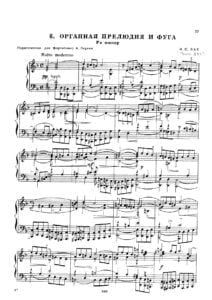 |
|
| Bach Gounod Prelude 1 Ave Maria Jazz Improvisation |
 |
|
| Bach Guitar – Fingerpicking Bach (with Tablature) |
 |
Bach Guitar – Fingerpicking Bach |
| Bach J.S. J.S. – French Suites (I to VI) |
 |
|
| Bach J.S. JS – BWV 208 – Sheep May Safely Graze (arr Friedman) | BACH JS BWV 208 | |
| Bach J.S. Air from Orchestral Suite no. 3 in D Major (trans. D. Weymouth) | Bach J.S. -Air-Weymouth | |
| Bach J.S. Jesu, Joy of Man’s Desiring – Piano Arr Groban, Josh |
 |
|
| Bach J.S. – Jazz Play Along Vol. 120 Pdf + Mp3 Audio Tracks |
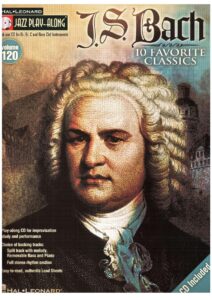 |
Jazz_Play_Along_Vol_120_-_J_S_Bach |
| Bach J.S. – Air on a G String |
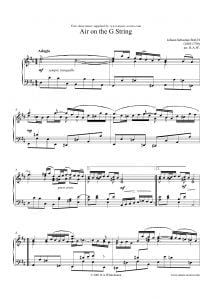 |
|
| Bach J.S. – Busoni Chaconne (piano solo arr.) |
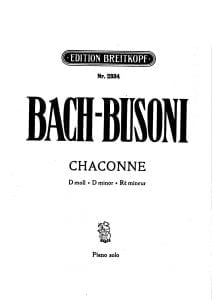 |
|
| Bach J.S. – BWV 565 Piano – Toccata E Fuga In Re Min | Bach – Bwv 565 Piano – Toccata E Fuga In Re Min | |
| Bach J.S. – Cantata BWV 147 – Coral ‘Jesus Bleibet Meine Freude’ (Easy Piano Solo) | Bach Jesu Joy Of Mans Desiring Cantata Bwv.147 Piano Solo Page 1 Of 5 | |
| Bach J.S. – Das Wohltemperierte Klavier HENLE VERLAG |
 |
|
| Bach J.S. – Easy Pieces for Classical Guitar – Notes & Tablature |
 |
Bach – Easy Pieces pieces for guitar |
| Bach J.S. – English Suites Inglesi (piano) BWV 806-811 |
 |
|
| Bach J.S. – Nun komm, der Heiden Heiland, BWV 659 | Bach, J.S. – Nun komm, der Heiden Heiland, BWV 659 | |
| Bach J.S. – Toccata and Fugue in D minor BWV565 (Piano solo arr. Grainger) |
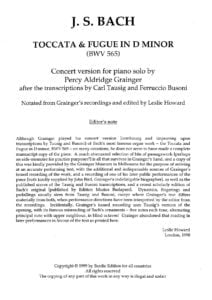 |
|
| Bach J.S. – Two Part Inventions Busoni |
 |
|
| Bach J.S. – Well-Tempered Klavier Analysis Part II Dr. H. Riemann |
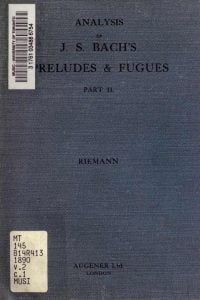 |
|
| Bach J.S. – Wilhelm Kempff 10 Bach Transcriptions for piano |
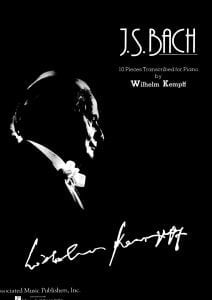 |
Kempff – 10 Bach Transcriptions |
| Bach J.S. (H Bauer) – Corale Dalla Cantata no. 147 “Jesu, Joy of man’s desiring” BWV 7 (Piano Solo) |
 |
|
| Bach J.S. (Marcello) – BWV 974 -Adagio | Bach (Marcelo) – BWV 974 -Adagio | |
| Bach J.S. 12 Small Preludes |
 |
|
| Bach J.S. 15 Three-voice Inventions |
 |
|
| Bach J.S. 15 Two part Inventions Pure Text Ed. Allan Peterson |
 |
|
| Bach J.S. 6 Partitas( I to VI) |
 |
|
| Bach J.S. AIR ON THE G STRING ARR. SILOTI |
 |
|
| Bach J.S. ARIA SUITE EN RE (arr. for 2 PIANOS) | Bach ARIA SUITE EN RE 2 PIANOS | |
| BACH J.S. Art Fugue Die Kunst der Fuge (Ed. Czerny ) BWV 1080 |
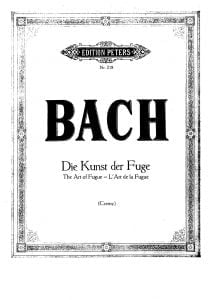 |
|
| Bach J.S. Art Of Fugue Czerny (Ed. Kalmus) BWV 1080 |
 |
|
| Bach J.S. Busoni BWV564 | ||
| Bach J.S. BWV 1055 keyborad concerto n 4 | ||
| Bach J.S. BWV 971 Italian Concerto | ||
| Bach J.S. Cantata 147 arr. for Easy piano solo | Bach-Jesu-Joy-of-Mans-Desiring-Cantata-BWV.147-Piano-Solo | |
| BACH J.S. CANTATA 22 ARR. PIANO SANCTIFY US BY THY GOODNESS arr. by Harried Cohen |
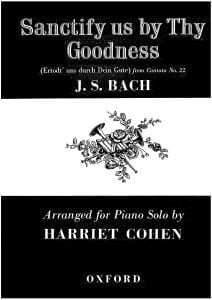 |
Jazz: Keith Jarrett – The Art of Improvisation. Exclusive Interviews with Keith Jarrett, Gary Peacock and Jack Dejohnette.
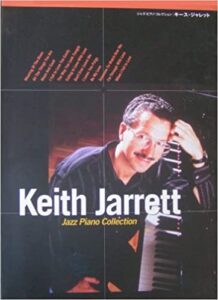
Keith Jarrett’s sheet music transcriptions are available from our Library.
Keith Jarrett: The Art of Improvisation
While he can often engender all manner of contention and argument, it’s unquestionable that Keith Jarrett is one of the most significant pianists to emerge in the second half of the 20th Century.
An artist who has done it all — performed his own sometimes lyrical, sometimes free-spirited compositions with two groundbreaking quartets in the ’70s; taken solo improvisation to a whole new level with a series of important recordings, including the classics Facing You and The Köln Concert.
Contributed a fresh spontaneity to the Great American Songbook with his Standards Trio; tackled the challenging classical repertoires of Bach, Mozart and Shostakovich and composed his own classical works; and played in landmark groups including Charles Lloyd in the ’60s and Miles Davis in the ’70s — Jarrett is also more than a little enigmatic.
Fastidious, perfectionist and, some might argue, highly controlled in his life, Jarrett paradoxically defines the concept of pure abandon in his playing.
With a life’s work that, classical repertoire aside, has always been about spontaneous creation, Jarrett is in an especially capable position to shed light on the true meaning of improvisation.
And so, British producer/director Mike Dibb, responsible for ’02’s The Miles Davis Story, has fashioned a new documentary which, while never explicitly defining what that elusive meaning is, nevertheless manages — after 85 minutes and a series of remarkably erudite interviews with Jarrett and those who have been close to him over the past 30 years — to create a vivid impression that is both inspirational to aspiring musicians and uniquely clarifying to others who want to understand the process of how musicians create something out of nothing.
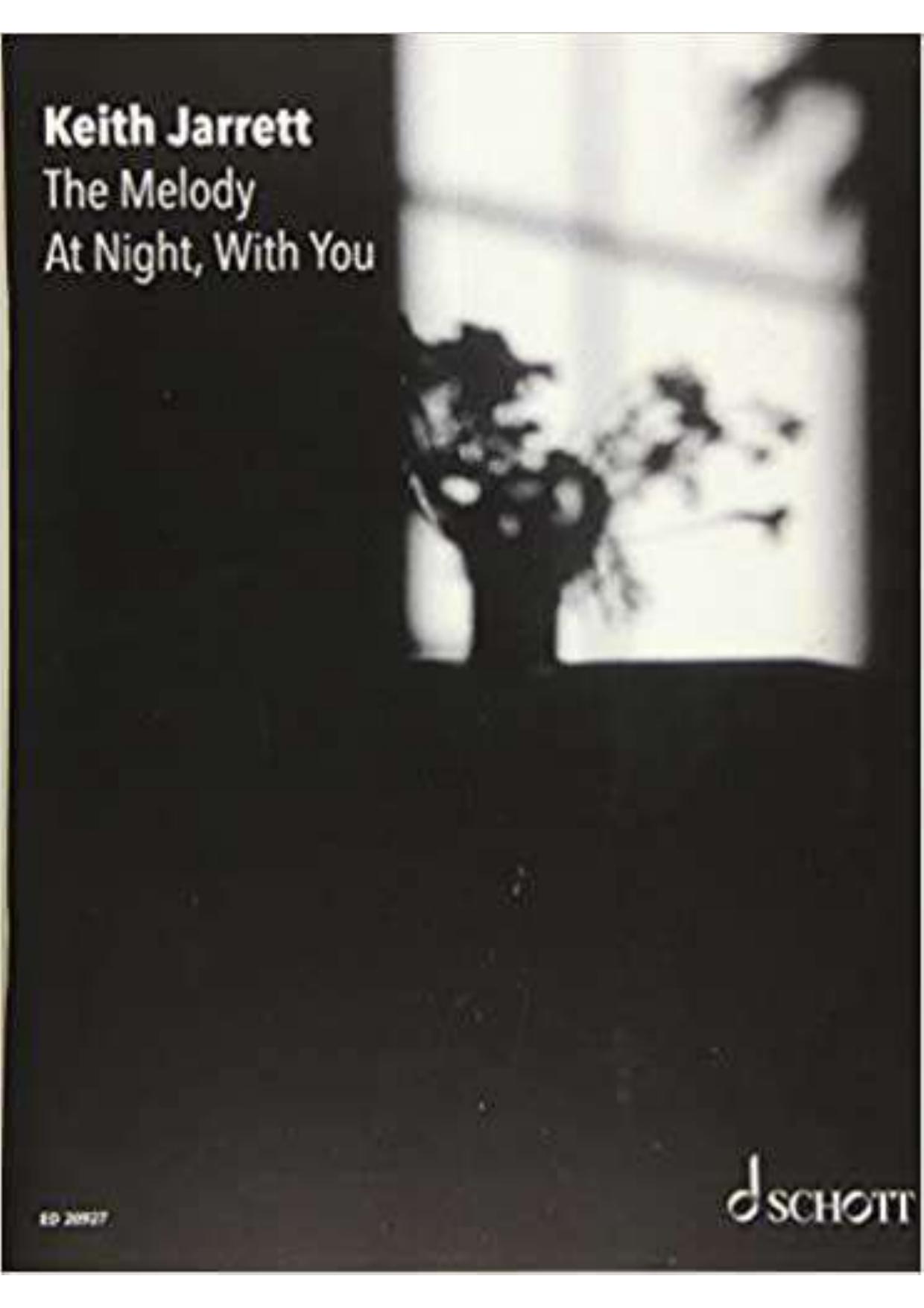
Rather than present a chronological examination of Jarrett’s life thus far, Dibb chooses, much like Jarrett’s own work, to use a seemingly non-linear approach that focuses on Jarrett’s improvisational process although, in the final analysis — just like Jarrett’s extemporization — there is an arc.
Beginning with the Standards Trio, then jumping back to his early days and ultimately ending with his European Quartet including saxophonist Jan Garbarek, bassist Palle Danielsson and drummer Jon Christensen, what becomes evident is that Jarrett’s goal has essentially been the same as when, precociously, he would add both his own original compositions and spontaneous creations to the classical repertoire of recitals dating back as early as when he was only eight years old.
Amongst the many interviews with past and present collaborators including Garbarek, Danielsson, Christensen, Charlie Haden, Gary Peacock, Jack DeJohnette, Chick Corea, Gary Burton and Dewey Redman, perhaps the most significant footage is that with ECM label owner and producer Manfred Eicher, with whom Jarrett found the perfect creative partner early in his career.
Keith Jarrett goes as far as saying that his albums are the product of two people — himself and Eicher — which is a significant distinction.
That Eicher has recorded far more Jarrett performances than have ever been or will ever be released in order to catch those moments of pure magic, those performances where Jarrett alone or with a group is truly at the moment, also demonstrates the high standard and level of discernment that both he and Jarrett apply to deciding what will ultimately be commercially distributed.
That Jarrett has, for 20 years, chosen only to document live performances, rather than record in the studio, is another distinction, one that points to a belief that the audience is, indeed, an integral part of each and every performance.
Jarrett comes across as deeply committed, albeit unquestionably idiosyncratic and unapologetically purist; while he admits to enjoying his time with Miles Davis — the only time in his career where he totally gave up acoustic piano for electric instruments — he also dismisses his electric work by calling such instruments “toys.
Few, if any, pianists other than Jarrett insist that a choice of pianos be provided for each performance, so that he can choose the best one for the concert hall. And the sheer physicality of his playing, along with his total and absolute involvement with the music to the exclusion of anything else, paints a unique picture — as does his level of communication.
Virtually all concert footage — including performances with Lloyd, Miles, the Standards Trio, and the American and European Quartets — demonstrates the incredible interaction that exists at every performance.
Jarrett has, in recent years, come under criticism with regard to the Standards Trio which, at over 20 years, is the longest-lasting group of his career — and, with rare exception, is one of the longest collaborations in the jazz period. Some say that the group has lost its creative edge.
But watching the footage of the trio, and listening to Jarrett, Peacock and DeJohnette discuss how little rehearsal takes place — in fact, rehearsals typically only occur in sound checks before concerts, and it’s not uncommon for the trio to work on something at a sound check and never actually play it in concert — one is truly drawn into the sense of adventure applied to every performance.
And the performance footage, in concert with the interview clips, manages to demonstrate the kinds of risks the trio take with each and every tune; how any one of the members can suggest a new direction with complete confidence that the others will follow.
By the time Dibb’s documentary reaches its end, one may not be able to explicitly define the art of improvisation, but there are profound conclusions implicitly reached. And the documentary compels one to either play some Jarrett recordings or, if Jarrett’s music is new to the viewer, to go out and find some.
The level of excitement and discovery is so vivid that even those who have become jaded with Jarrett in recent times may find themselves with renewed interest. While some bemoan Jarrett’s abandonment of writing, what becomes clear — and Jarrett articulates this at one point — is that every performance involves the act of composition. And that, perhaps more than anything, is the true meaning of improvisation.
